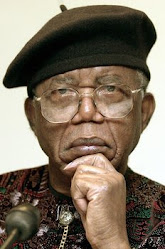 The Caine Prize for African Writing 2015 anthology is titled Lusaka Punk and Other Stories. It contains seventeen short stories. Five of the stories were shortlisted for the 2015 Caine Prize while the remaining twelve were authored by participants of the 2015 Caine Prize African Writers' Workshop. I'll begin with the shortlisted stories.
The Caine Prize for African Writing 2015 anthology is titled Lusaka Punk and Other Stories. It contains seventeen short stories. Five of the stories were shortlisted for the 2015 Caine Prize while the remaining twelve were authored by participants of the 2015 Caine Prize African Writers' Workshop. I'll begin with the shortlisted stories.Shortlisted Stories 2015
Nigeria's Segun Afolabi opens this collection with his short story The Folded Leaf. It's about a group of physically challenged Nigerians who travel by bus to receive miracles at the spiritual retreat of famous evangelist, Pastor Fayemi. They head out with hearts full of hope and pockets full of donations raised by an entire church over a period spanning several months. They're the poor ones who scrape up money out of the little they have because the pastors have stressed the importance of giving monetary donations in direct proportion to the amount blessings you want to receive. When it's all over the group heads back home in silence. It's no surprise there's such a distrust of religion worldwide. We need to do something about these globetrotting monsters who swindle gullible devotees of millions in exchange for "blessings" and then use those donations to buy private jets and mansions in different countries. Segun Afolabi is amazing and he's a good choice to open this collection.
Elnathan John (Nigeria) follows Afolabi's lead with the tale Flying. I love the first five sentences of Flying. In this tale, a young boy named Tachio lives in an orphanage under the proprietorship of Aunty Keturah. She's the one person he can confide in and she provides some sort of stability in an otherwise routine existence. I won't say more. I like it a lot. It's simple and quite moving.
FT Kola (South Africa) follows with A Party for the Colonel, a story about a troubled Indian family in apartheid South Africa. Ibrahim is a man who works really hard to make something out of nothing for himself and his family. He's sure that wealth is the ticket out of oppression and into respectable ranks. It's a story that seems doomed from the beginning and I like it a lot.
Masande Ntshanga (South Africa) penned Space, a story about a gang of young boys who run around a lot without parental supervision. The ending felt abrupt and thus the story felt somewhat incomplete. I didn't really get this story.
Namwali Serpell (Zambia) penned The Sack. An elderly man lives alone with a young boy named J. They've both lost Nana, a woman they both cared about. Serpell shuffles between dreams and the present and it was disorienting. I'm not really sure what's going on in this story...
Workshop Stories 2015
#Yennenga was written by Jemila Abdulai (Ghana). A well-known journalist has been arrested for murder. Her arrest has the nation taking sides with social media hashtags #FreeYennenga vs #DeathToYennenga. The public has its theory on how she rose to fame and whether or not she's innocent of the charges brought up against her but only Yennenga knows the truth. It's a decent story.
The Road Workers of Chalbi was written by Dalle Abraham (Kenya). I loved it immediately. Chinese workers arrive to a little village, the villagers marvel at their proficiency and gossip about their foreign habits. Everyone co-exists in peace for a while but you already know this can't possibly last forever. It's an interesting tale and one that I like.
Nkiacha Atemnkeng (Cameroon) wrote Wahala Lizard. I got excited a few minutes into it because it seemed fresh and different. An aircraft passenger falls terribly sick and is overheard saying that he hopes he hasn't caught the ebola virus thereby sending the plane's occupants into a panic. A story about an aircraft passenger with ebola, aboard a plane? I prepped myself for the drama I was sure would enfold. There wasn't enough drama to satiate me. There was a discussion among the passengers and then the tale veers off from where you think it's all headed.
Diane Awerbuck (South Africa) wrote Nehushtan, a tale centered around Malan. Malan is an engineer currently working on the construction of a dam located close to a small village. He's still trying to cope with the death of his only child and the effects of that loss on his marriage. He's also concerned about the quality of work on the construction project, a responsibility recently passed on to him after the previous engineer bailed out. I like this story.
Swallowing Ice by Nana Nyarko Boateng (Ghana) is that "sweet center" buried deep at page 157 in this 267 paged collection. In Swallowing Ice a journalist, who writes under the pseudonym "Vivian Quack" for Ghana's Daily Times, lives out her routine existence mostly in her apartment. Everything seems fine until life happens. I love this story so much. I paused for a while before moving on. I'll keep an eye for out anything by Boateng. Much respect.
Efemia Chela (Ghana/Zambia) wrote Lusaka Punk, the titular story of this year's collection. It's about teenagers living life during the holiday. Without much to do they focus their energies on teenage proclivities and punk rock. It's not an exciting page-turner but looking back now I appreciate Chela's work.
The Writing in the Stars was written by Jonathan Dotse (Ghana). This story starts out with a character called "Guardian", there are people on horses, wearing cloaks, bearing swords, and there's a kingdom that needs to be protected... Right from the first page I started thinking: Oh gawdd... This is not really my thing... When will this end... The guardian part of the story represented the past and after that introduction we're taken forward in time to the year 2036, the present. Sarah's working on her second Ph.D. and she has discovered a book buried deep in a shrine. The book is encrypted and she works hard to decode it because she believes it holds some secret from an ancient past. This is a creative story but I appreciated it after I was done reading it.
Burial was written by Nigeria's Akwaeke Emezi. In Burial, a young girl deals with the life-changing death of her beloved father. His burial brings in relatives from all corners and this coming together leads to her discovery of some troubling secrets. I love it a lot. Emezi writes really beautifully. I can't wait to read the novel she's currently working on.
In The Song of a Goat by Pede Hollist (Sierra Leone), a young girl arrives home to tell her mom she has been suspended from school for two weeks. She's surprised when her mom sits her down for a talk instead of punishing her immediately. The talk is a trip down memory lane, a trip her very disappointed mother deems necessary and possibly more effective than thrashing Stella.
Princess Sailendra of Malindi by Kiprop Kimutai of Kenya. A crazy girl believes she's a princess. She and her brother seem to be wanderers and they do drugs. It's a bit confusing and it ends as badly as you'd expect. I don't like this story. It's so murky as though it needs to be read twice but much more slowly the second time.
In Blood Match by Jonathan Mbuna, Hilda needs a kidney transplant to save her life. Her husband and a few relatives offer to help but their blood type and hers aren't compatible. Salvation comes from an unexpected source and leads to an unforeseen revelation.
Colored Rendition by Aisha Nelson (Ghana) closes out this collection but not at all in the amazing, mind-blowing way a Caine Prize anthology should end. A small school welcomes Marcia and Cliff, two teenage lovers who've come down to Africa for philanthropic purposes. The school doesn't seem to be any of the things the expect it to be. I don't really know what the focus of Colored Rendition was. I didn't like it at all. It's another murky one.
Most Memorable Stories
1) Swallowing Ice by Nana Nyarko Boateng (Ghana)
2) Burial by Akwaeke Emezi (Nigeria)
3) Flying by Elnathan John (Nigeria)
4) The Folded Leaf by Segun Afolabi (Nigeria)
The Caine Prize for African Writing 2015 anthology is a very eclectic collection. I believe the opening and closing stories are important considerations for any anthology and I do not like the story chosen to close out this collection. It wasn't at all strong and memorable. I'm glad I chose the Caine Prize anthology and I'm excited that I'll be reviewing it every year. I can't wait to see what literary treasures 2016 brings. Have an amazing and fulfilling New Year everyone!
[Image via Amazon]




















